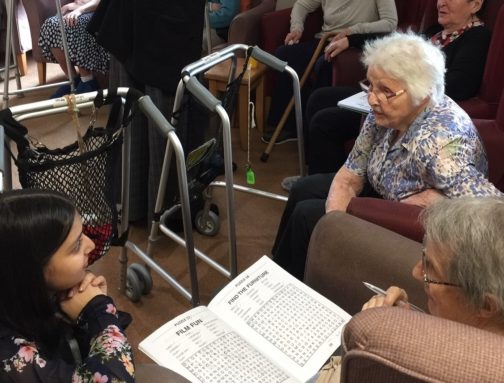School will close for the Summer break on Friday 18 July. All pupils and students will be dismissed from 12.00.
10 tips to manage your transition to A-Level
Okay so you’ve finished Year 11 and you’ve already been at home enjoying your long summer break for weeks now. However, as GCSE results day approaches, we know that it is likely that your thoughts are slowly turning towards September…
And the truth is that whether you are joining us as a new student or transitioning from our own Year 11 – starting sixth form can be a daunting prospect. With new people, new teachers, new subjects & new expectations.
However, there are plenty of things that you can be doing to start preparing for Year 12. Here are just a few ideas to get you started…
1. Consider your course choices carefully
During Year 11 you will have received lots of advice and support about making your post-16 subject choices. Over the summer months, it can be wise to look back over any resources you have and to check that you are still happy with your choices.
If you are not confident that you will meet the requirements for a certain subject or you are no longer sure about studying it, be sure to research and prepare a list of alternative choices in advance – so that you can discuss these options with us at enrolment, without making rushed last minute decisions!
This is important as once you begin your A-Level studies, it is not easy to change courses. We can only consider requests to change courses during the first 3-4 weeks of term. After this point, we do not allow changes, due to the large amount of lesson content that will have been missed.
Check our A-Level subjects and Entry Requirements
2. Check out exam specifications
During Year 11 you will have received lots of advice and support about making your post-16 subject choices. Over the summer months, it can be wise to look back over any resources you have and to check that you are still happy with your choices.
If you are not confident that you will meet the requirements for a certain subject or you are no longer sure about studying it, be sure to research and prepare a list of alternative choices in advance – so that you can discuss these options with us at enrolment, without making rushed last minute decisions!
This is important as once you begin your A-Level studies, it is not easy to change courses. We can only consider requests to change courses during the first 3-4 weeks of term. After this point, we do not allow changes, due to the large amount of lesson content that will have been missed.
Check our list of exam boards

3. Revise GCSE content
Not many students take the time to revise GCSE content after their exams have finished, because… who would?
However, most key concepts and ideas for any course in the first year of sixth form follow on directly from GCSE. So if you make the effort to stay on top of your game and expand your understanding after your GCSEs, you’ll start Year 12 way ahead of those who have forgotten everything over the summer!
If you are starting a brand new subject that you did not study at GCSE – don’t worry! Have a look at the suggested transition tasks for those subjects and use these to familiarise yourself with some of the key concepts.
4. Read ‘around’ the subject
If you are choosing a subject at A-Level, it is hopefully because you find it at least somewhat interesting? If so, it can be useful to think about the topics and issues that relate to this subject and try to identify how these are linked to the world around you.
- What are the newest emerging ideas, technologies or areas of research in this subject?
Keeping up to date with the latest developments helps to ensure that you have a realistic understanding of the subject area and it’s relevance to the world around you. This may help to shape your ideas about future career possibilities or further study. - Has this topic been in the news recently?
If so, read the latest articles and then reflect on what you have read – what are your own opinions on this? - Who are the prominent experts or organisations in this field?
Follow them on social media and engage with content that they produce. If relevant, maybe you could read books or articles that they have written.
By building a broader understanding of your subjects, you will create a structure that helps you to apply the knowledge gained in the classroom and put this into context.
5. Visualise your goals
Think about WHY you have chosen to study A-levels? What are your personal motivations for success at the end of your course?
- As a stepping stone to university?
- To develop your skills?
- To become more independent?
- To enter your dream career?
- To make your family proud?
- To earn a lot of money in the future?
- Because you enjoy the process of learning?
Everyone has their own reasons, but thinking about and clearly visualising your goals will make it much easier to motivate yourself when times are challenging.

I intend to study a BSc Computer Science which will help me further reach my career goals of working with Artificial Intelligence. I am so thankful for the opportunities at this sixth form and I don’t think I would experience this elsewhere.
– Ahmed, Class of 2020
6. Manage your expectations
The pace of learning at A-level is much faster than at GCSE, so in order to keep up with the content in lessons, you will need to be completing additional work in your own time. In fact for each hour spent in a classroom, you will generally be expected to do an additional hour of independent research, homework or revision in your own time.
This is why at UoBS we build study periods into your daily timetable. So whilst they may initially seem like ‘free’ time to socialise, each period actually represents an hour of study that is needed achieve success at A-Level. So don’t waste them!
7. Be prepared to ask for (and accept) help
As A-Levels are the preparation for university and your future careers, your teachers will now start expecting you to take on much more responsibility for your own learning, organisation and time management.
This doesn’t mean however that you are completely on your own! It just means that you need to be proactive in asking for support when you need it. This could be simply asking a friend for advice about a question you didn’t understand or it might mean approaching your subject teachers for tailored advice on improving a skill that you struggle with.
It also means making the most of any additional opportunities that may be offered to you, such as pastoral support, careers appointments, mentoring or targeted study sessions.
8. Start thinking about gaining work or volunteering experience
Even if you don’t yet know what you want to study at university or what career you might like to enter in the future, work experience is a valuable way to develop key personal skills and learn about what kind of roles you might enjoy. It can never be too early to get started on gaining experience in different areas.
A part-time job or a regular volunteering role (such as a youth group, sports club or charity) can look fantastic on future university applications and can also contribute towards something like a Duke of Edinburgh Award. However, it is important to manage your time so that you are able to manage studying alongside your other commitments.
Alternatively, all UOBS students are encouraged to undertake at least 5 days of work experience or volunteering during Year 12 and we will regularly send out opportunities to our students. to get involved in. But if you are proactive – why wait? Why not look for one or two short-term placements to complete over the summer break…?

9. Plan your commute
As we do not have a ‘catchment’ area for our sixth form students, we understand that you will be travelling to us from across the city. Therefore it is really important to consider the practicalities of your travel to and from campus each day
- How long will the journey take and what time will you need to wake up in the morning?
- Will you need to use public transport? If so, which routes will you use?
- If you need to use multiple bus/trains, how long do you need to account for changes?
If you are not sure about the journey, it can be worth trying a ‘test run’ during the summer.
Our school address is
12 Weoley park Road
Selly Oak
Birmingham
B29 6QU
10. Shop for your suit
Our Sixth Form students do not have to wear a branded school uniform, however we do feel that it is very important for our students to feel the sense of belonging and professional identity that is created through a formal dress code.
We expect our students to adhere to a business wear dress code (as detailed on our website here) however as we do not have a specific supplier, students are able to purchase their attire independently, shopping according to their own budgets and personal taste – within our guidelines!
Further information about will be provided as part of your Enrolment Pack, prior to the start of term in September
